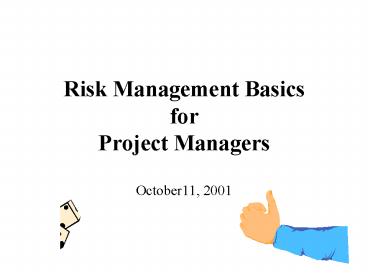Risk Management Basics for Project Managers - PowerPoint PPT Presentation
1 / 26
Title:
Risk Management Basics for Project Managers
Description:
Examples from my experiences with risk management techniques ... 1. An African antelope that is able to bound over boabob trees, or ... – PowerPoint PPT presentation
Number of Views:346
Avg rating:3.0/5.0
Title: Risk Management Basics for Project Managers
1
Risk Management Basicsfor Project Managers
- October11, 2001
2
Overview
- Background
- What does the PMBOK say?
- Examples from my experiences with risk management
techniques - Recommendations for a basic risk management
technique - Resources/references
3
Background
4
My Qualifications
- Why am I qualified to present this topic to you?
- Background (shady)
- Education (I did really well in 3rd grade)
- Lack of chapter competent speaker volunteers
(YES!) - Experience lessons learned (gray hair tells it
all--learned lessons the hard way)
5
Risk Management Is Not...
- Safety activity focused
- Workmens compensation/disability focused
- Insurance claim focused
- Accounting focused
6
Risk Management Is...
- Dealing with events that can impact your project,
whether those events are known or unknown to the
project team - Why? So you can meet your project goals
- Cost
- Schedule
- Technical performance
7
How Do You Risk Manage?
- You use all of the talent and ability of the team
to deal with the major risks!
Risk management helps you, as a Project Manager,
be successful! and get gigantic pay raises and
your boss will like you
8
What is a PMBOK?
- 1. An African antelope that is able to bound
over boabob trees, or - 2. An abbreviation for a new STD, or
- 3. A large, boring book that contains pearls of
wisdom surrounded by pages of silly definitions
and lists, or - 4. A PM resource of immense value
9
PMBOK
- Four major processes to manage risk
- Risk identification
- Risk quantification
- Risk response development
- Risk response control
- This is virtually a universal process!
10
Risk Identification
- What events are likely to affect the project
outcome? - Risk ID is a regular, periodic project activity
- Includes both internal and external events
(project team controllable and uncontrollable) - Output list of risk sources, risk events and
triggers (symptoms)
11
Risk Quantification
- Which risks are worth responding to?
- Probability X impact highest values get
emphasis - Can be measured in impact, schedule impact,
performance impact or qualitatively - Output list of the risk opportunities that
require project team attention
12
Risk Quantification
13
Risk Response Development
- How does the project team respond to each risk?
- Three potential responses avoidance, mitigation
or acceptance - Output Risk Management Plan with planned
responses.
14
Risk Response Control
- How does the project team execute the risk
management plan? - Monitor and control the execution of the plan
with iterative, adaptive process - Output corrective actions and updates to the
risk management plan
15
Real World Experiences
16
Real World Experience 1 (1978)
- Contractual technical and cost performance
measurement program (DoD EW program) - Monthly report of key technical and cost
parameters as contract deliverable - If measure exceeded thresholds, corrective action
plans required - Very structured (and expensive)
- Lesson learned Must be scaleable
17
Real World Experience 2 (1989)
- Complete avoidance by transferring risks to
vendors (ATF concept development phase) - Teams got 500 million to meet requirements, but
competitors spent several billion each - Development phase implemented with completely
different risk management plan - Lesson learned Risk-sharing partnerships are
desirable
18
Real World Experience 3 (1997)
- Simple, qualitative, minimum-effort risk
management process appropriate for all projects - Following portion of the presentation describes
this process
19
Recommended Process
20
Personal Experience Guidelines
- Two kinds of risk management real and
eyewash. Usable, real risk management has 3
process characteristics - Appropriate level of complexity and cost
- Risk list status are visible to the entire
team. - Regular team risk status reviews
Result Understanding of risk influences
day-to-day activities of team members
21
Recommended Minimum Process
- Start risk management at team formation
- Use entire team to brainstorm risk list
- Team discusses each risk and votes on
perception of impact and probability - The risk with the highest impact/probability
products are the high risk list that the team
must deal with
22
Process, contd
- Develop risk management worksheet for each high
risk. - These worksheets and the process documentation
are the entire Risk Management Plan - Review status regularly with the team, take
appropriate corrective actions and make
appropriate changes
23
Process, contd
- Execute the risk management plan when a trigger
is reached. - Put the actions into the project plan with owners
and dates - Track execution
- Periodically review project (team activity) for
additions or deletions to risk plan
24
Process Diagram
25
(No Transcript)
26
Good References
- Project Management Book of Knowledge and various
textbooks (www.pmibookstore.org) - American Graduate University Procurement
Associates (www.agu.edu) - Defense Systems Management College
(www.dsmc.dsm.mil)































